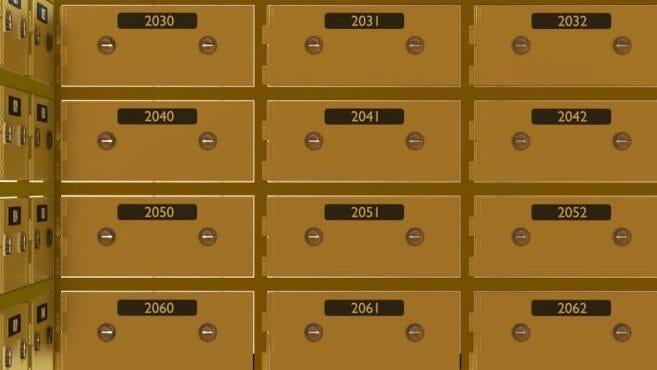Quick Navigation
How often do you use your Social Security card? What about your marriage license or birth certificate?
While they might come in handy at certain times, these important documents aren’t daily necessities. As such, most people choose to store them in a safety deposit box when they aren’t in use.
While we trust our bank or credit union to keep our boxes as secure as possible, are they really as safe as their name implies?
Today, we’re exploring this question in greater detail. We’ll also take a look at whether or not most boxes are covered by your insurance and how you can keep your valuables protected at all times.
Ready to learn more? Let’s get started!
Why Use a Safety Deposit Box?
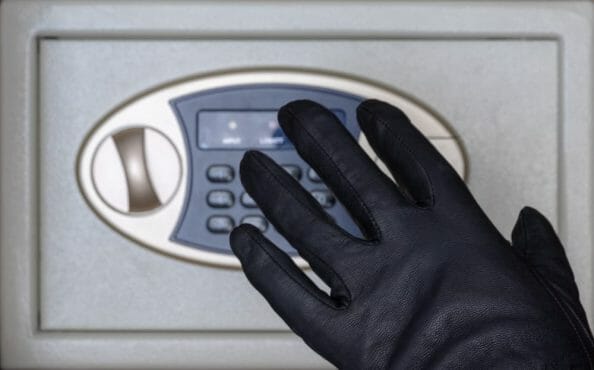
A safety deposit box (or safe deposit box) is a relatively shallow, long container secured by an individual lock. Most come in the form of a metal box. The box stays in a special safe or vault within a federally insured bank or credit union.
Why use one?
As mentioned, these can be an ideal place to store important documents. They’re also a smart place to put special keepsakes (such as heirloom jewelry) or anything else that you want to keep protected from common household dangers or contaminants.
When you put your special tokens in a safety deposit box, you’re relying on the security of the bank building itself to keep the box intact. While some homeowners choose to keep such items in a safe on their own property, a safe deposit box is specially designed to withstand myriad natural disasters that could pose a risk to an at-home safe. These include:
- Hurricanes
- Tornadoes
- Fires
- Floods
How Does a Safety Deposit Box Work?
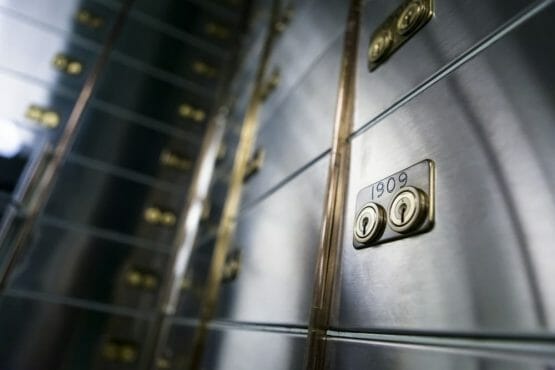
You can’t simply walk into your local bank and open a safe deposit box, no questions asked. Instead, you’ll need to enter into a formal rental agreement that allows you to use your assigned box for as long as you need it. You can choose to rent a box in your name only, or you can add other co-lessors to your lease.
If you go the latter route, your co-lessors will have the same level of access to the box that you do. They’ll also have an equal right to the contents kept within the box. As such, it’s important to choose responsible people who you know won’t take advantage of this privilege to access items or documents they should not be privy to.
When you’ve completed the rental form, the bank will give you a key to access your box during operating hours. The bank will keep a second “guard key” that accompanies yours. Both keys are required to open your box.
One caveat? Some modern systems are eschewing physical keys in favor of an electronic locking system. In this case, you’ll need to scan your finger or your hand to access your box. The bank employee opening your box will also have to follow electronic user authentication procedures.
In this way, safety deposit boxes are more secure than you might imagine. Regardless of whether your bank uses a traditional key or electronic system, all box holders have to show some form of identification before they can access the box.
Are Safety Deposit Boxes Insured?
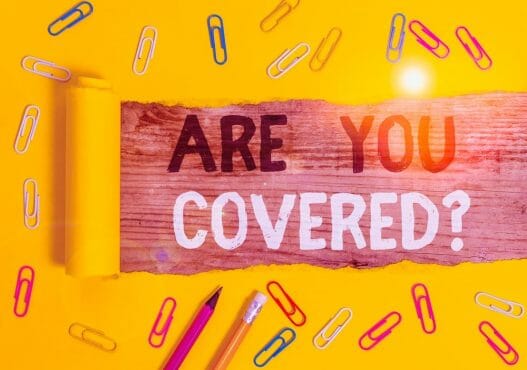
The short answer? Not exactly.
The contents inside of your safety deposit box are not insured in the same way that monetary deposits are insured at your bank or credit union. Your bank account is insured by the Federal Deposit Insurance Corporation, which covers deposits in U.S. banks and thrifts up to a certain amount.
However, while the FDIC will cover the money in your checking, savings, CDs and money market accounts, this coverage does not carry over to your safety deposit box.
Why?
These boxes are highly confidential.
Even bank employees will not know what you keep in yours and will allow you to open it in private. As such, there is no way to know the value of what you have stored inside. The items could be worth zilch or they could be worth millions. For that reason, banks do not offer insurance on those contents.
Moreover, in the rare event that an item within your box is damaged or stolen, there are also no federal laws in place designed to help you recover those losses. This could happen if your co-lessor destroys or steals an item, or a natural disaster damages the bank’s physical structure.
Purchasing Supplemental Insurance
The good news? Although the FDIC won’t insure the contents inside your box, you can purchase supplemental insurance and pay to cover it yourself. This is a smart move, especially if you keep pricey items inside of yours.
Talk to your insurance agent about adding a special policy to your homeowner’s insurance, renter’s insurance or contents insurance policy.
In most cases, you can add the contents of your safety deposit box onto one of those two plans with ease. You’ll do so by creating a special policy called a “personal articles rider” or floater. Some companies might also refer to this new policy as a “scheduled personal property endorsement“. As a benefit, most insurers will also give you a discount on this new policy as long as you keep the secured items in a deposit box at the bank.
If you don’t want to go through your own insurance company (or if you don’t have any other policies currently in place), you still have options. You’ll just need to do your research to find companies that specialize in offering policies for your content.
Protecting Your Valuables
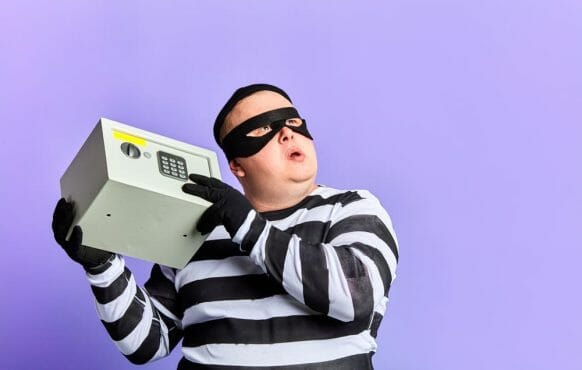
Whether you have insurance coverage or not, there are certain steps you can take to keep your important items as safe as possible inside your safety deposit box. This way, in the event of a natural disaster, they’ll be as protected as possible. These include:
- Putting all items inside a water-safe, zipped plastic bag
- Keeping the bags inside Tupperware containers
- Interviewing banks and credit unions to better understand security policies
Box Storage Dos and Don’ts
Now that you know a little more about how safety deposit boxes are insured, what items should you store in yours? Which items should you keep at home? Let’s take a look.
What to Store
- Personal papers (deeds, birth certificates)
- Special collections (stamps, coins, rare magazines)
- Jewelry
- Rare collectibles
- Special contracts (insurance policies)
- Important business papers
For the most part, these should be items that you won’t likely need in case of an emergency.
To be safe, before adding them to your box, go ahead and make a copy of your important documents to use at home. For instance, you might need a copy of a birth certificate to apply for a job, obtain a mortgage or simply sign your child up for sports. Rather than running to the bank every time, you can keep a copy on hand for such requirements.
It’s also smart to let your children and another close, trusted family members know about the location of your security deposit box in case of an emergency.
Upon your death, the bank could continue to issue invoices for your rental payment. If your heirs do not know where yours is located and as such, do not pay the bill, the box will be considered abandoned. At that point, the bank will turn the contents over to your state’s unclaimed-property offices, where it will be available for auction.
What Not to Store
The general rule is to never store an item in your box that you might need in an emergency situation. As discussed, you won’t be able to access it outside of normal banking hours. That said, what would happen if you needed your passport to travel overnight to visit a sick loved one, but it was miles away and locked up for the weekend?
The shortlist of items that aren’t recommended for safe deposit box storage include:
- Passports
- Un-insured valuables
- Cash
- Any illegal item
- Only copies of important legal and medical documents (advanced medical directives, living wills, durable powers of attorney)
Instead of taking these to the bank, keep them protected at home in the best fireproof document safe. While it might not be quite as secure as a box, it’s better than storing them in a standard metal filing cabinet in the home office.
Open a Safety Deposit Box With Confidence
No, they aren’t fail-safe. Still, a safety deposit box is a smart and secure way to store your valuables. You can also find ways to cover the contents with a special insurance policy!
For these reasons, it’s in your best interest to open one up at your local bank or credit union. Following the advice above, store appropriate items in yours and lock it with confidence.
Looking for more advice on how to stay safe and keep your loved ones protected? We cover it all on our blog.
Contact us today to learn more tips on how to maximize home and business security today!

